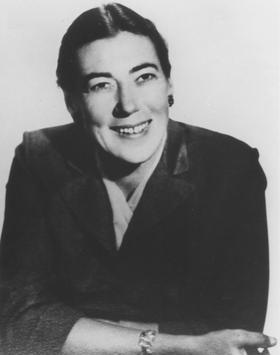Evelyn Hooker
Evelyn Hooker (September 2, 1907 – November 18, 1996) was an American psychologist renowned for her pioneering research into sexual orientation and psychology. Her work significantly contributed to the understanding and acceptance of homosexuality within the psychological community and society at large. Hooker's studies challenged the prevailing view of homosexuality as a mental illness, leading to a major shift in the perception and treatment of LGBTQ+ individuals.
Early Life and Education[edit | edit source]
Evelyn Hooker was born in North Platte, Nebraska. She pursued her undergraduate studies at the University of Colorado, where she developed an interest in psychology. After completing her bachelor's degree, Hooker earned her Ph.D. in psychology from Johns Hopkins University in 1932. Her early academic career was marked by a broad interest in human behavior and personality.
Career and Research[edit | edit source]
In the 1950s, Hooker's research focus shifted towards the psychology of homosexuality, a topic that was largely ignored or stigmatized by her contemporaries. She was inspired to study this area after forming a friendship with a gay man, who introduced her to his circle of friends. These interactions led Hooker to question the prevailing psychiatric view of homosexuality as a pathological condition.
Hooker's most notable study involved administering a series of psychological tests to groups of homosexual and heterosexual men. Her groundbreaking finding was that there was no significant difference in the mental health of homosexual and heterosexual men, challenging the notion that homosexuality was inherently pathological. This research was presented at the American Psychological Association's annual convention in 1956, making a profound impact on the field.
Legacy[edit | edit source]
Evelyn Hooker's work played a crucial role in the eventual removal of homosexuality from the American Psychiatric Association's Diagnostic and Statistical Manual of Mental Disorders (DSM) in 1973. Her research contributed to changing societal attitudes towards LGBTQ+ individuals and laid the groundwork for future advocacy and research in the field of sexual orientation and psychology.
Hooker's contributions to psychology have been recognized with numerous awards and honors. Despite facing considerable opposition and skepticism during her career, her perseverance and dedication to understanding human sexuality have left a lasting legacy.
Death[edit | edit source]
Evelyn Hooker passed away on November 18, 1996, leaving behind a body of work that continues to influence the fields of psychology and LGBTQ+ studies.
Search WikiMD
Ad.Tired of being Overweight? Try W8MD's NYC physician weight loss.
Semaglutide (Ozempic / Wegovy and Tirzepatide (Mounjaro / Zepbound) available. Call 718 946 5500.
Advertise on WikiMD
|
WikiMD's Wellness Encyclopedia |
| Let Food Be Thy Medicine Medicine Thy Food - Hippocrates |
Translate this page: - East Asian
中文,
日本,
한국어,
South Asian
हिन्दी,
தமிழ்,
తెలుగు,
Urdu,
ಕನ್ನಡ,
Southeast Asian
Indonesian,
Vietnamese,
Thai,
မြန်မာဘာသာ,
বাংলা
European
español,
Deutsch,
français,
Greek,
português do Brasil,
polski,
română,
русский,
Nederlands,
norsk,
svenska,
suomi,
Italian
Middle Eastern & African
عربى,
Turkish,
Persian,
Hebrew,
Afrikaans,
isiZulu,
Kiswahili,
Other
Bulgarian,
Hungarian,
Czech,
Swedish,
മലയാളം,
मराठी,
ਪੰਜਾਬੀ,
ગુજરાતી,
Portuguese,
Ukrainian
Medical Disclaimer: WikiMD is not a substitute for professional medical advice. The information on WikiMD is provided as an information resource only, may be incorrect, outdated or misleading, and is not to be used or relied on for any diagnostic or treatment purposes. Please consult your health care provider before making any healthcare decisions or for guidance about a specific medical condition. WikiMD expressly disclaims responsibility, and shall have no liability, for any damages, loss, injury, or liability whatsoever suffered as a result of your reliance on the information contained in this site. By visiting this site you agree to the foregoing terms and conditions, which may from time to time be changed or supplemented by WikiMD. If you do not agree to the foregoing terms and conditions, you should not enter or use this site. See full disclaimer.
Credits:Most images are courtesy of Wikimedia commons, and templates, categories Wikipedia, licensed under CC BY SA or similar.
Contributors: Prab R. Tumpati, MD

